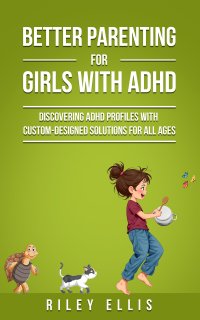Unlike your redneck uncle, ADHD does not discriminate. It only appears that it does because the boys are the ones getting handed out diagnoses like funnel cakes at the county fair.
Why is that?
Because the boys (and a few girls) are rowdy and loud and constantly on the move. By age seven, their parents and teachers alike are questioning the life choices that led them to believe they might be a positive influence in the lives of growing minds.
Meanwhile, girls with ADHD are daydreaming out the window, their attention caught by a passing butterfly. Their brand of ADHD is creating turtle ballets while a teacher drones on about the rules of subtraction. These girls are armchair diagnosed as “lazy, slow, odd, daydreamer, anxiety riddled, etc.” They are struggling with their own unique brand of ADHD, and the signs are overlooked until these girls turn up suicidal, and possibly not even then. Once called ADD, we now know that the hyperactivity is happening in their heads, not their bodies.
BETTER PARENTING FOR GIRLS WITH ADHD will:Help you recognize the signs of ADHD – Did you know it is often GENETIC and highly HERITABLE? Look around you, my friend, what’s that family tree looking like?Help you discover your daughter’s (and possibly your own, because you know you didn’t have the luxury of a diagnosis either) ADHD profile.Help you learn better strategies for both parenting and teaching toward their ADHD profile.Teach you the peak weeks for ADHD world domination.Assuage any feelings of guilt you may have. You aren’t the only parent who missed the signs and continues to live knowing you have been a complete and utter screwup.You are only steps away from becoming a better parent and helping your daughter become the successful, brilliant, best version of herself. Whether your daughter has been diagnosed or is only showing signs that leave you wondering what the heck is up with her, BETTER PARENTING FOR GIRLS WITH ADHD will help both of you meet the challenges to come.
Early interventions in the lives of children with ADHD sets them up for success and makes everyone’s lives easier, but even if you are coming to this party later in life, this book is still for you – because you probably arrived with things like depression, suicidal thoughts (or actions), bipolar disorder, eating disorders, addictions, and an entire host of other mental disorders in your party bag.
Between Poppy’s antics and Riley’s shame, you’ll leave these pages laughing and hopeful. It’s time to let someone else have a turn at the walking disaster gig, you’re over it.













